Alexvi's photo exhibition sheds light on mobile phone era
Writer: Cao Zhen | Editor: Zhang Chanwen | From: Shenzhen Daily | Updated: 2023-09-01
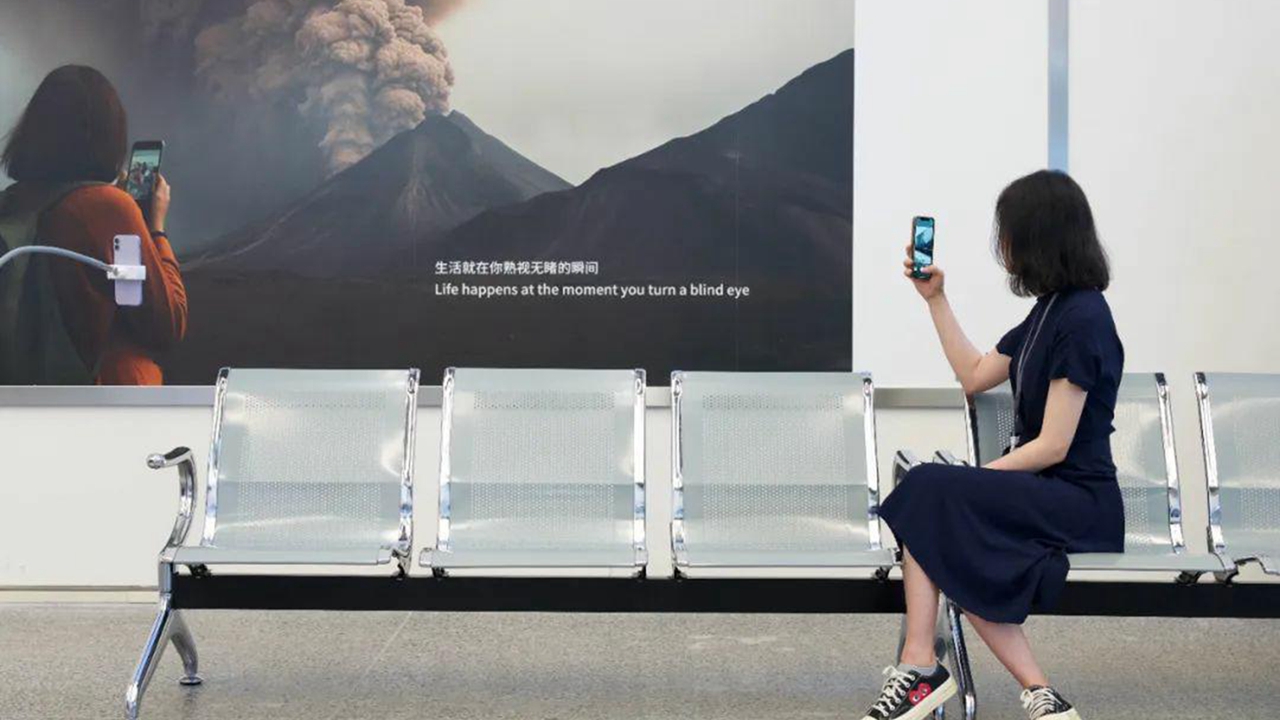
A visitor takes photos at “Alexvi: 1/3 Solo Exhibition” at Pingshan Art Museum. Photo from Pingshan Art Museum
In this era of mobile devices, taking photos has become commonplace, as have photography exhibitions. However, presenting a photo exhibition in a creative way can leave viewers astounded. The Pingshan Art Museum, known for its unique approaches in presenting exhibitions, such as the “Nine-Tiered Pagoda” project in the past, is currently showcasing photographic works by Chinese artist Li Xiaoliang, better known as Alexvi.
Fascinated by the constant presence of people engrossed in their mobile phones, either in subways, bedrooms, conference rooms, waiting halls, or in scenic spots and on escalators, Alexvi captured these individuals wherever he encountered them. He is exhibiting the photos shot in 40 cities of 12 countries at the exhibition titled “Alexvi: 1/3 Solo Exhibition.”

Alexvi’s photo of people engrossed in their mobile phones are shown on a phone at the exhibition. Photos by Cao Zhen unless otherwise stated
Curated by Bao Dong, the exhibition presents familiar life scenarios, incorporating elements such as a bed, a conference room, waiting chairs, beach chairs and a section of an escalator. Instead of simply displaying the photos on the walls or regular screens, the exhibition takes a different approach by embedding digital photos inside several mobile phones.
These devices are then strategically placed within the scenarios created for the exhibition, allowing visitors to swipe through the phones themselves and immerse themselves in a world defined by ubiquitous mobile devices.
“I invite visitors to view the photos in a special way, allowing them to establish a connection with the individuals portrayed. Visitors here are more than mere observers; they become active participants,” Alexvi explained.

Alexvi’s photo of a man engrossed in his mobile phone is shown on a phone at the exhibition.

A conference room is recreated at the exhibition. Visitors can view Alexvi’s photos displayed on the mobile phones on the desk.
At the opening of the exhibition Aug. 12, Alexvi said that this photo project titled “Lonely Planet” began in 2015. A year later he published the photos in a book, which is now displayed alongside another photo book titled “On Reading” by André Kertész (1894-1985) at the exhibition.
A dialogue is formed between Kertész’s photos, depicting the profound connection between readers and books in the last century, and Alexvi’s photos, capturing the omnipresent fixation modern people have on their mobile phones.
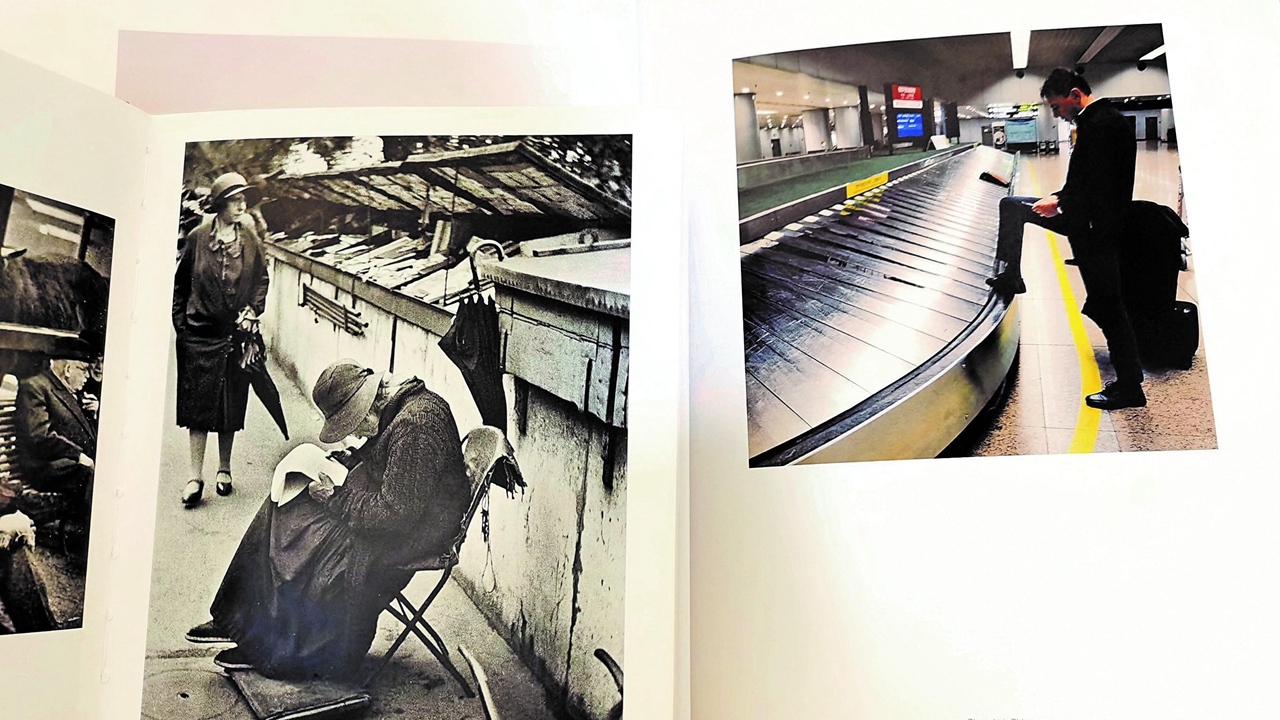
André Kertész’s photo book “On Reading” depicting people reading books in the last century is displayed next to Alexvi’s photo book “Lonely Planet” capturing modern people engrossed in their mobile phones.
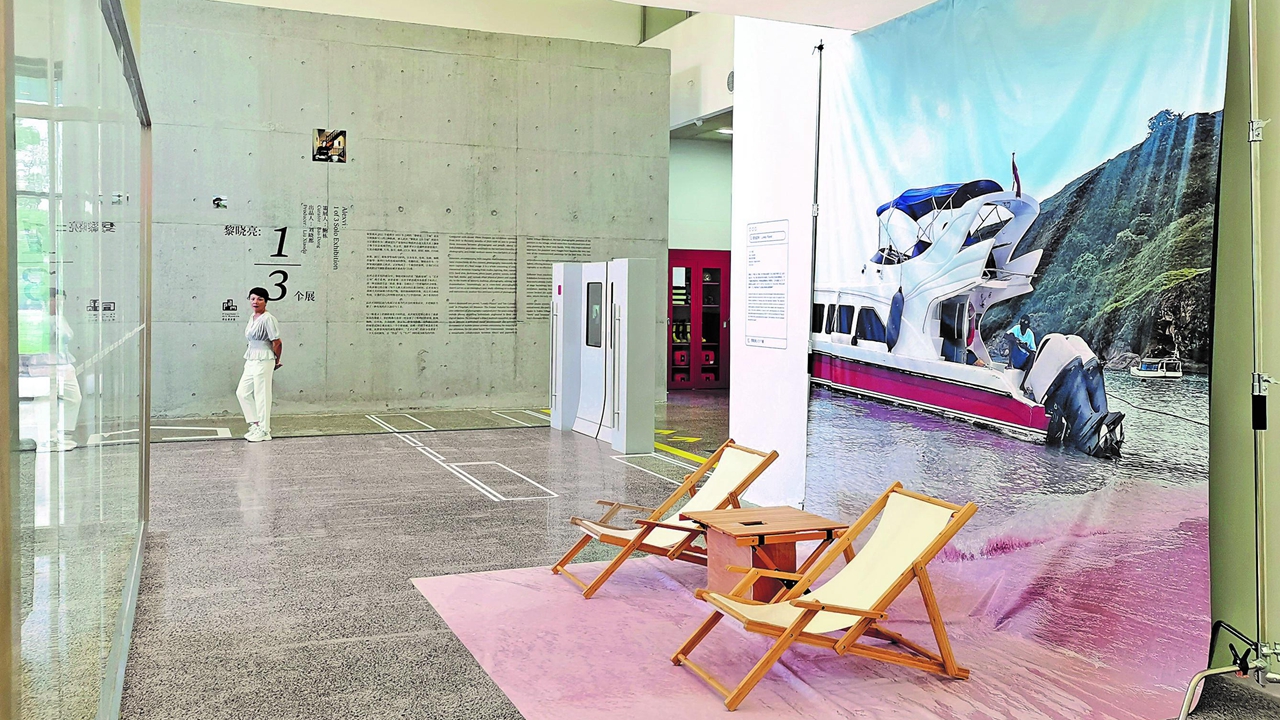
A beach scene is recreated at the exhibition.
In addition to the “Lonely Planet” photos, the exhibition also presents another series by Alexvi, called “Art Commission.” This series is a collaborative effort between Alexvi and eight painters from Dafen Oil Painting Village in Shenzhen.
Alexvi took photos of the painters, who then used these photos as inspiration to create paintings. In this oil painting village known for commissioned art, the photos of the painters became the source material for their commissioned works in this project.
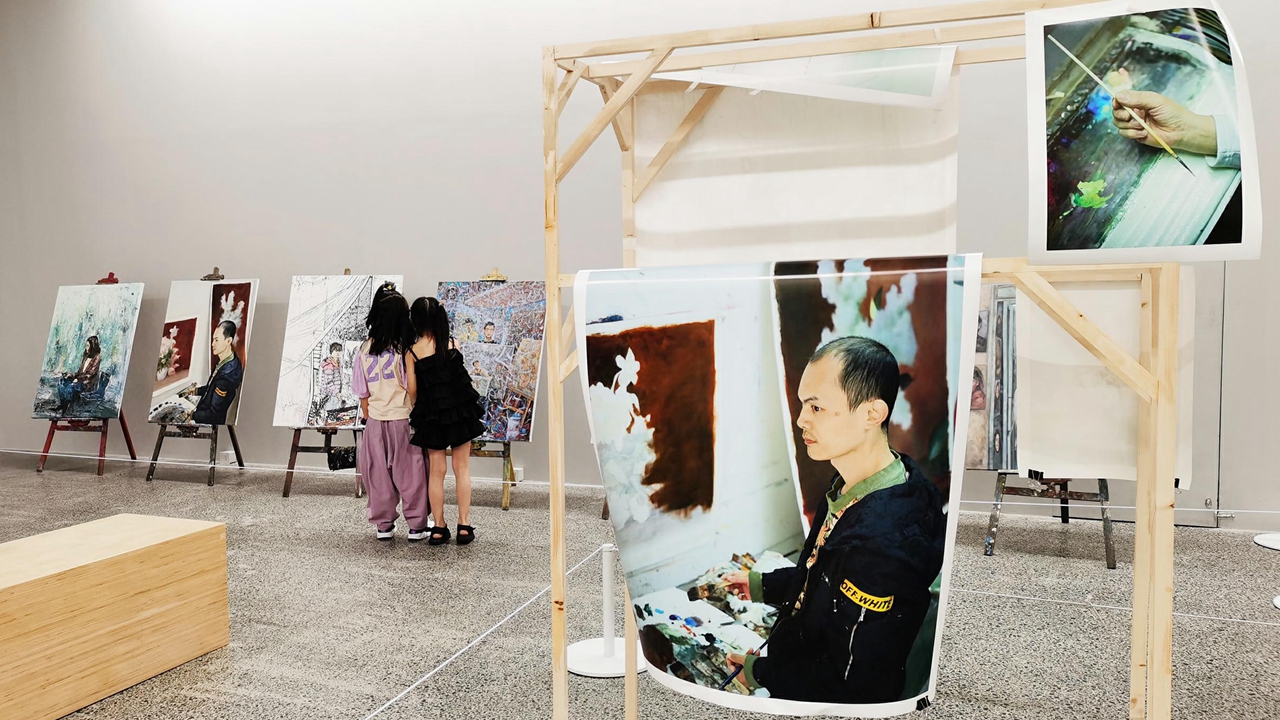
Alexvi’s photos of painters of Dafen Oil Painting Village are on display alongside with paintings created by these painters.
In a dedicated exhibition room, Alexvi has recreated a painting studio, in which the artist’s photos and the painter’s paintings are placed on easels, the wall is adorned in a manner that resembles a spotted canvas, and a documentary recording this project is shown onto another spotted canvas, adding a layer of artistic immersion.
“Old spotted canvases are not only the painters’ traces but also artworks they unintentionally created. The exhibition is an attempt to showcase how electronic devices and digital images influence the way people create art and impact the art and image industries. They are affecting every user,” said Alexvi.
The artist’s photo book “Lonely Planet” has won the Photobook Awards Martin Parr Edition at the Lianzhou Foto Festival, and his project “Peking Apartments” has won the Fine Art Photography Awards in London. Alexvi has also collaborated with influential fashion and art magazines to shoot photos of celebrities.
Photos generated by artificial intelligence (AI) are also on display at Alexvi’s Pingshan exhibition. “AI photography is considered a future phase of photography, but I don’t believe it will replace traditional photography as it lacks a human perspective. The direct experiences and perspectives of individuals hold crucial importance,” said Duan Yuting, founder of the Lianzhou Foto Festival and the Lianzhou Museum of Photography, at the Aug. 12 opening.
“AI photography may find its place in commercial or other domains, but when it comes to artistic creation, I don’t see it posing a significant challenge,” she said.
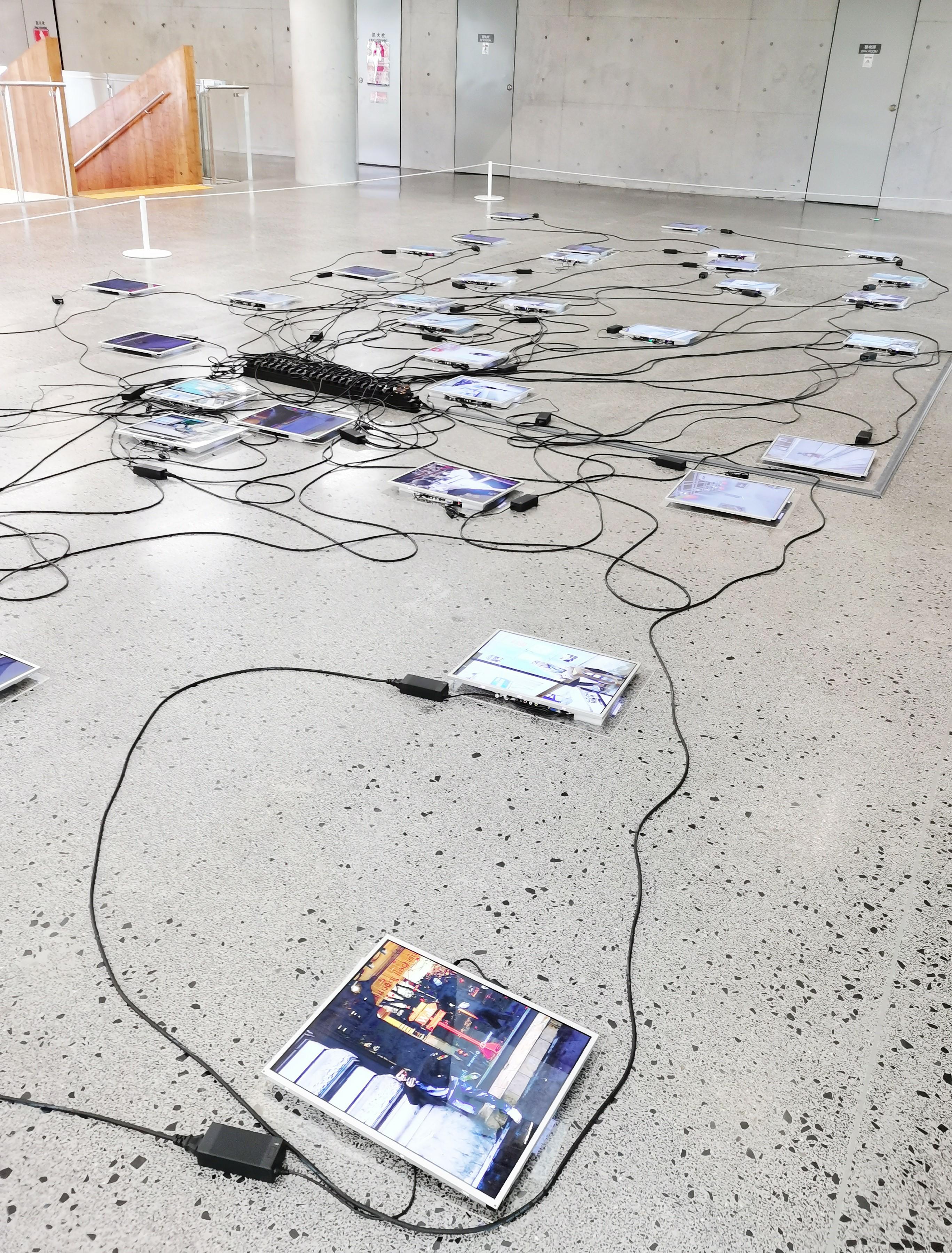
Alexvi’s photos of people immersed in their phones are shown on the ground at the exhibition.
The closing date of the exhibition hasn’t yet been announced. Due to Typhoon Saola, the art museum is temporarily closed until further notice on its WeChat account (ID: PingshanArtMuseum).
Hours: 9 a.m.-5 p.m., closed Mondays
Venue: Pingshan Art Museum, Pingshan District (坪山美术馆)
Metro: Line 14 to Pingshan Square Station (坪山广场站), Exit D1